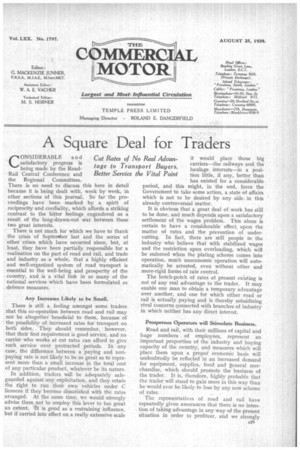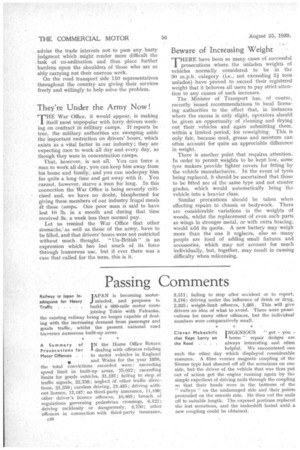A Square Deal for Traders
Page 27

Page 28

If you've noticed an error in this article please click here to report it so we can fix it.
C°") and satisfactory s is being made by the RoadRail Central Conference and the Regional Committees. There is no need to discuss this here in detail because it is being dealt with, week by week, in other sections of this journal. So far the proceedings have been marked by a spirit of reciprocity and cordiality, which affords a striking contrast to the bitter feelings engendered as a result of the long-drawn-out war between these two great interests. There is not much for which we have to thank the crisis of September last and the series of other crises which have occurred since, but, at least, they have been partially responsible for a realization on the part of road and rail, and trade and industry as a whole, that a highly efficient and well-organized system of road transport is essential to the well-being and prosperity of the country, and is a vital link in so many of the national services which have been formulated as defence measures.
Any Increases Likely to he Small.
There is still a feeling amongst some traders ,that this co-operation between road and rail may not be altogether beneficial to them, because of the possibility of increased rates for transport on both sides. • They should remember, however, that their first requirement is good service, and no carrier who works at cut rates can afford to give such service over protracted periods. In any case, the difference between a paying and nonpaying rate is not likely to be so great as to represent more than a small increase in the total cost of any particular product, whatever be its nature.
In addition, traders will be adequately safeguarded against any exploitation, and they retain the right to run their own vehicles under C licences if they become dissatisfied with the rates arranged. At the same time, we would strongly advise them not to employ this lever to too great an extent: It is good as a restraining influence, but if carried into effect on a really extensive scale it would place those big carriers—the railways and the haulage interests—in a position little, if any, better than has existed for a considerable period, and this might, in the end, force the Government to take some action, a state of affairs which is not to be desired by any side in this already controversial matter.
It is obvious that a great deal of work has still to be done, and much depends upon a satisfactory settlement of the wages problem. This alone is certain to have a considerable effect upon the matter of rates and the prevention of undercutting. In fact, there are still people in the industry who believe that with stabilized wages and the restriction upon overloading, which will be enforced when the plating scheme comes into operation, much uneconomic operation will automatically be arrested, even without other and more-rigid forms of rate control.
The hotch-potch of rates at present existing is not of any real advantage to the trader. It may enable one man to obtain a temporary advantage over another, and one for which either road or rail is actually paying and is thereby subsidizing rival concerns connected with branches of industry in which neither has any direct interest.
Prosperous Operators will Stimulate Business.
Road and rail, with their millions of capital and huge numbers of employees, represent an important proportion of the industry and buying capacity of the country, and measures which will place them upon a proper economic basis will undoubtedly be reflected in an increased demand for equipment, supplies, food and general merchandise, which should promote the business of the trader. It is, therefore, highly probable that the trader will stand to gain more in this way than he would ever be likely to lose by any new scheme of rates.
The representatives of road and rail have repeatedly given assurances that there is no intention of taking advantage in any way of the present situation in order to profiteer, and we strongly , advise the trade interests not to pass any hasty judgment which might render more difficult the task of co-ordination and thus place further burdens upon the shoulders of those who are so ably carrying out their onerous work.
On the road transport side 110 representatives throughout the country are giving their services freely and willingly to help solve the problem.
They're Under the Army Now !
rrHE War Office, it would appear, is making itself• most unpopular with lorry drivers working on contract in military camps. If reports be true, the military authorities are sweeping aside the important restriction on drivers' hours, which exists as a vital factor in our industry ; they are expecting men to work all day and every day, as though they were in concentration camps.
That, however, is not all. You can force a man to work all day, you can keep him away from his home and family, and you can underpay him for quite a long time and get away with it. You cannot, however, starve a man for long. In this connection the War Office is being severely criticized and, we have no doubt, blasphemed for giving these members of our industry frugal meals A these camps. One poor man is said to have lost 10 lb. in a month and during that time received 38. a week less than normal pay.
Let us remind the War Office that other stomachs,' as well as those of the army, have to be filled, and that drivers' hours were not restricted without much thought. " Un-British " is an expression which has lost much of its force through humorous use, but if ever there was a case that called for the term, this is it.
Beware of Increasing Weight
THERE have been so many cases of successful prosecutions where the unladen weights of vehicles normally considered to be in the 30 m.p.h. category (i.e., not exceeding 2i tons unladen) have proved to exceed their registered weight that it behoves all users to pay strict attention to any causes of such increases.
The Minister of Transport has, of course, recently issued recommendations to local licensing authorities to the effect that, in instances where the excess is only slight, operators .should be given an opportunity of cleaning and drying out their vehicles and again submitting them, within a limited period, for reweighing. This is only fair, because mud, grease and moisture can often account for quite an appreciable difference in weight.
There is another point that requires attention. In order to permit weights to be kept low, some tyre makers provide lighter covers for fitting by the vehicle manufacturers. In the event of tyres being replaced, it should be ascertained that those to be fitted are of the same type and not stouter grades, which would automatically bring the vehicle into a heavier class.
Similar precautions should be taken when effecting repairs to chassis or bodywork. There are considerable variations in the weights of woods, whilst the replacement of even such parts as wings in stronger metal, or with extra bracing, would add its quota. A new battery may weigh more than the one it reglaces, also so many people are fond of adding small fixtures and accessories, which may not account for much individually, but, together, may result in causing difficulty when relicensing.












































































